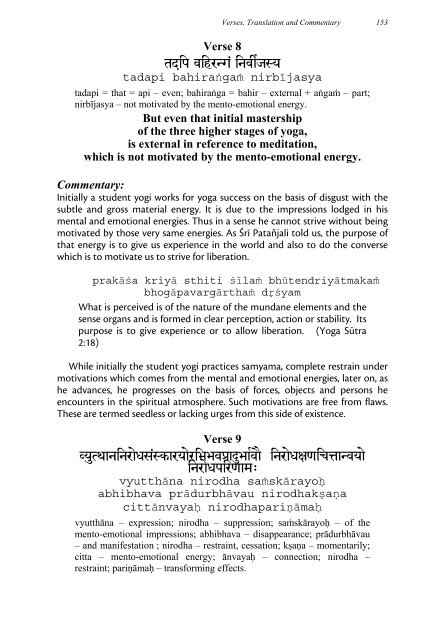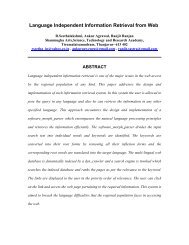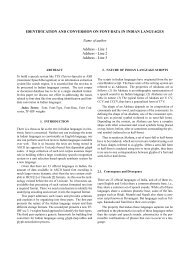Create successful ePaper yourself
Turn your PDF publications into a flip-book with our unique Google optimized e-Paper software.
Verses, Translation and Commentary 153<br />
Verse 8<br />
tdip vihrNg< invIRjSy<br />
tadapi bahiraṅgaṁ nirbījasya<br />
tadapi = that = api – even; bahiraṅga = bahir – external + aṅgaṁ – part;<br />
nirbījasya – not motivated by the mento-emotional energy.<br />
But even that initial mastership<br />
of the three higher stages of yoga,<br />
is external in reference to meditation,<br />
which is not motivated by the mento-emotional energy.<br />
Commentary:<br />
Initially a student yogi works for yoga success on the basis of disgust with the<br />
subtle and gross material energy. It is due to the impressions lodged in his<br />
mental and emotional energies. Thus in a sense he cannot strive without being<br />
motivated by those very same energies. As Śrī Patañjali told us, the purpose of<br />
that energy is to give us experience in the world and also to do the converse<br />
which is to motivate us to strive for liberation.<br />
prakāśa kriyā sthiti śīlaṁ bhūtendriyātmakaṁ<br />
bhogāpavargārthaṁ dṛśyam<br />
What is perceived is of the nature of the mundane elements and the<br />
sense organs and is formed in clear perception, action or stability. Its<br />
purpose is to give experience or to allow liberation. (<strong>Yoga</strong> Sūtra<br />
2:18)<br />
While initially the student yogi practices samyama, complete restrain under<br />
motivations which comes from the mental and emotional energies, later on, as<br />
he advances, he progresses on the basis of forces, objects and persons he<br />
encounters in the spiritual atmosphere. Such motivations are free from flaws.<br />
These are termed seedless or lacking urges from this side of existence.<br />
Verse 9<br />
VyuTwaninraexs<br />
vyutthāna nirodha saṁskārayoḥ<br />
abhibhava prādurbhāvau nirodhakṣaṇa<br />
cittānvayaḥ nirodhapariṇāmaḥ<br />
vyutthāna – expression; nirodha – suppression; saṁskārayoḥ – of the<br />
mento-emotional impressions; abhibhava – disappearance; prādurbhāvau<br />
– and manifestation ; nirodha – restraint, cessation; kṣaṇa – momentarily;<br />
citta – mento-emotional energy; ānvayaḥ – connection; nirodha –<br />
restraint; pariṇāmaḥ – transforming effects.










